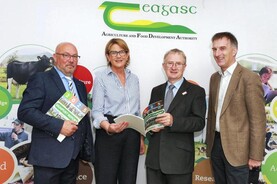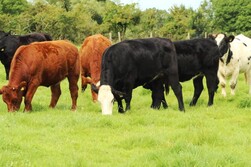The European Union has set itself the legally binding target of reducing its greenhouse gas emissions by 55% by 2030, compared to the emissions levels recorded in 1990.
By 2050, the EU aims to be climate neutral, meaning that there should be no net emissions of greenhouse gases by that date.
These targets are laid down in the EU’s Climate Law, adopted in 2021.
A host of further policy measures were agreed in 2023 and 2024 to ensure the 2030 target is met.
While EU climate policy is marching on, it seems that the EU’s policy plans to shift to sustainable agriculture are stuck, especially following the farmers’ protests.
However, climate policy will nevertheless require action in the agricultural sector, and the impacts of climate change are revealing the agricultural sector’s vulnerabilities across Europe.
Inevitable transition
A future-looking agricultural sector in Ireland should therefore work proactively to enhance farmers’ adaptive capacity, ensuring that the inevitable transition is as smooth and just as possible for farmers.
In the first months of 2024, after farmers’ protests in several European countries, the European Commission stepped back from its promises to push for a more sustainable farming sector in Europe.
Policy plans to impose stricter restrictions on the use of pesticides in farming were rolled back in February.
In March, the Nature Restoration Law faced backlash among member states at the last moment, with concerns over targets for the restoration of Europe’s land and seas. And in April, agreement was reached to relax environmental requirements under the Common Agricultural Policy.
Furthermore, initial discussions on a new climate target for the EU for 2040 avoided mentioning specific actions in the agricultural sector, against the advice of the European Scientific Advisory Board on Climate Change.
These roll backs may be seen as a victory for the farmers’ protests, but, in reality, they simply delay inevitable decisions and actions needed in the face of both climate change impacts and climate policy.
Climate impacts across Europe
The European continent is warming twice as fast as the global average, and the impacts of the changing climate are evident everywhere, including in Ireland.
The European State of the Climate Report 2023, published on 22 April by the World Meteorological Organisation, highlights the major climate impacts that Europe and Ireland suffered in 2023.
With a new climate target expected for 2040, we should expect more policy measures in the coming years
These changes included higher intensity storms, heatwaves, droughts, and unusually high precipitation – events that directly impact the agricultural sector – leading to losses of €13.4bn, with wide health and wellbeing impacts. Without increased resilience and adaptive capacity in farming, many farmers will likely see a reduction in their outputs, with changes required in their farming practices.
This will inevitably questions about the livelihoods and well-being of many farmers that are already under pressure for a variety of other reasons.
Another scientific assessment, the European Climate Risk Assessment, published in March by the European Environment Agency, shines a light on our exposure to critical risks if urgent action is not taken to slow down climate change and improve our capacity to adapt to climate impacts.
This analysis shows that the food system is facing substantial or critical risks. These include the impacts of climate change on soil health, crop production and on food security, driven by increasing floods, excessive precipitation, droughts, and heat stress.
EU policy is in part driven by such scientific assessments. But, even if policy does not advance swiftly, such scientific assessments should be seen as important blueprints for the future of the agricultural sector in the years and decades to come.
Current EU climate policy
Although we have seen delays in certain policy areas in response to the farmers’ protests, EU climate policy marches on. Some climate policy measures are directly impactful for the agricultural sector, while others will affect the agricultural sector as a side-effect.
In 2023 and 2024, several important policy measures were adopted in the EU to implement the target to reduce greenhouse gas emissions by 55% by 2030.
These measures require action across two main pillars: first, to reduce emissions of a host of greenhouse gases, including only carbon dioxide, but also methane, nitrous oxide, and others.
And second, to enhance the capacity of nature to absorb emissions of carbon dioxide.
Measures to reduce emissions include regulations, targets, financial incentives, and carbon pricing across all sectors, by reducing energy consumption, shifting away from fossil fuels in heating, transport and electricity-generation, and tackling emissions of methane and other gases from specific sectors (including agriculture).
Measures to enhance sinks include adopting targets and (financial) incentives to restore the capacity of natural ecosystems to absorb carbon, including by increasing and improving the quality of forest coverage, and enhancing soil quality.
Some of these policies have their origins in policy measures from the early 2000s.
The past trends in EU climate policy show us that once such policies are in place, they are periodically revised to become more stringent, covering more sectors.
With a new climate target expected for 2040, we should expect more policy measures in the coming years that expand further into the working of the agricultural sector, both directly and indirectly.
Elections and future EU climate policy
With polls indicating changes in the political context after the European elections in June, EU climate policy may not be the political priority that it once was.
But the political outcomes of the elections are unlikely to lead to any major roll-back or dismantling of existing climate targets and policies. The direction of EU climate policy is set, with targets embedded in law, and implementing legislation adopted. All sectors will need to contribute.
In the context of increasingly frequent and severe climate impacts affecting agriculture, the transformation of the farming sector is inevitable.
Preparing for future impacts and planning for a smoother and just transition to a sustainable agricultural sector needs to be the strategic priority for farmers and farmers’ associations for the coming years.
Claire Dupont is Research Professor of European Governance of Sustainability Transformations at Ghent University, Belgium.






 This is a subscriber-only article
This is a subscriber-only article










SHARING OPTIONS: